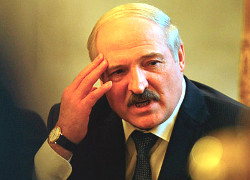Passing the buck
83- 12.09.2013, 8:06
- 81,930

Prices for petrol, vodka and utilities are growing in Belarus and the authorities are looking for whom to blame for the crisis.
Economic problems are piling up in Belarus day after day. Bright evidence to that is a sharp price growth in utility tariffs within the past few weeks. They country’s leadership is being reproached for shifting the problems of providing budget incomes onto the citizens and attempting to blame Belarusians for their own economic miscalculations instead of approaching the situation in its complexity and trying to resolve it, the Novye Izvestiya reports.
Petrol went up in price in Belarus at the beginning of September. This happened because the excise duty on car types petrol has grown by 45% and by 70% - on diesel fuel. Before that fuel had become expensive in the country on 16 January this year and no plans had been scheduled on raising the prices. Several weeks after the petrol vodka became more expensive. Apart from that it turned out that utility tariffs would be gradually growing. According to government’s plans, they should comprise 15% of the average basket of goods. They are now at the level of 7-8%.
Everyone from the heads of executive committees to Lukashenka advised Belarusians to live within their means after the crisis of 2011. Country’s economic agencies even calculated how to do that: operational efficiency should not surpass the salary growth. But the successful year of 2012 gave economic optimism to the Belarusian leadership again, and the authorities started speaking of an average salary not of $500, like before, but of $1000. However in 2013 the country has faced economic problems again – foreign trade balance has gone negative, with the decrease in the potassium fertilizers market a decrease in budget incomes is expected. In addition to that Russia threatens to ban Belarusian dairy products from its market. Together with the external problems an internal one has aggravated: the salary growth has again surpassed the labour productivity. Speaking simpler, Belarusians get more than the economy earns.
An acute problem that the country is facing is the outflow of working force. According to consulting agencies, 1-1.3 million Belarusians went to work in Russia only last year, which is a third of the employable population. Naturally, if the salary goes down in the country, the flow of labour migrants will increase. The government suggested to stop the migration in several ways: introduce a tax on being jobless, impose higher utility tariffs, higher education and health care fees on the citizens, not working for the national economy.
Belarus’ Ministry of Internal Affairs even tried to identify such people by visiting apartments in rounds. When all these measures failed to be implemented in practice, the authorities concluded that such workers should be deprived of a pension. According to Lukashenka’s recent decree, only those Belarusians can now claim the minimal pension, who have worked no less than 10 year in the country making the required payments into the social security fund. Previously 5 years were enough for that.
If, according to the government, motorists were guilty of the 2011 crises, who purchased cheap cars in Europe before the introduction of higher tax duties, then now everyone who goes abroad and takes foreign currency out is to blame.
The worst are the ones who prefer buying cheap clothes, footwear, perfumes in Lithuania and Poland. Back in summer it was Belarus’ Prime Minister Mikhail Miasnikovich who took offence for Belarusians not wanting to buy domestic goods, but spending billions abroad instead. Last Friday Lukashenka suggested a very simple solution to the problem: to make people going abroad pay $100. Indeed, you can have both – smaller queues at the border and higher budget incomes.









